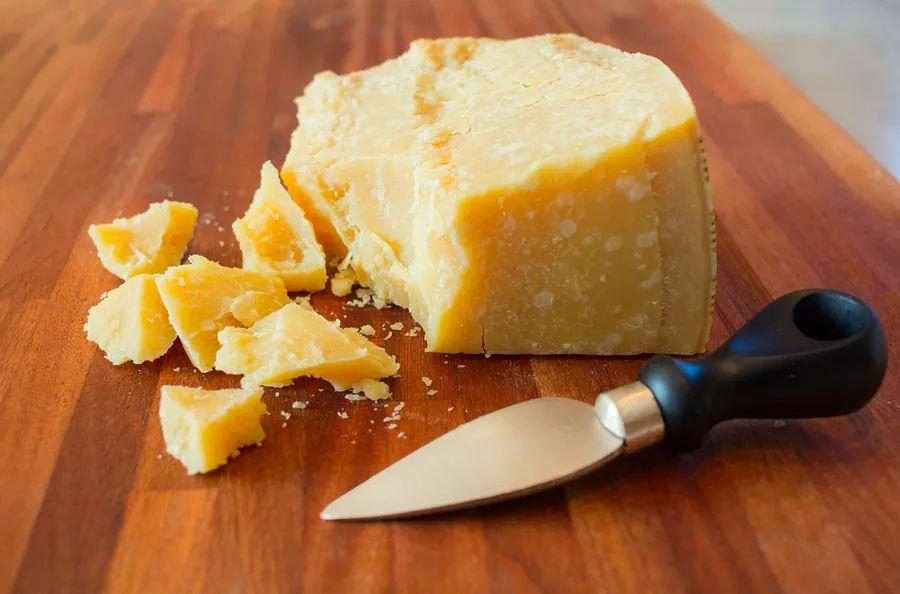Wait… Parmesan Cheese Isn't Vegetarian?

For many vegetarians, cheese is a convenient treat or a hurdle that keeps them from fully committing to a vegan lifestyle. Alongside milk and eggs, it’s a reliable source of protein, offering an easy way to maintain nutrition without the ethical concerns of eating meat.
But not all cheeses are made the same, and some aren’t technically vegetarian. If you're a pasta lover, Caesar salad fan, or just an Italian food enthusiast, here’s a shocker: Parmesan cheese isn’t vegetarian.
So, why exactly isn’t Parmesan cheese considered vegetarian?
The answer lies in rennet, a key ingredient used in the Parmesan-making process. Rennet comes from the stomach lining of young grazing animals like calves, goats, or lambs, and contains an enzyme called chymosin, which is essential for curdling the milk in cheese production.
Historically, obtaining rennet involved cutting up the stomachs of young calves, then soaking the pieces in salt water or whey with an acid like vinegar or wine to extract the enzymes. Once filtered, this solution could coagulate large amounts of milk. While modern methods are more refined and use chemistry to produce stronger rennet, the stomach of a calf remains central to the process.

What does rennet do in the Parmesan-making process?
To ease your conscience, know that those stomachs are integral to the creation of Parmesan cheese. The enzyme chymosin they contain helps separate the milk's solids from liquids, which is essential for transforming the milk into cheese.
In Parmesan production, rennet is added after unpasteurized cow's milk is heated to begin the separation process. After that, not much is needed, and the cheese matures on its own. In fact, for a cheese to legally be called Parmesan in the European Union, it must come from the "Reggiano" region of Italy and be made with only cow's milk, salt, and calf rennet, highlighting the importance of that stomach-derived enzyme.
Do other cheeses contain rennet?
Unfortunately, Parmesan is far from the only cheese where rennet is used. Other Italian cheeses like Pecorino Romano, Grana Padano, and Gorgonzola (which now has non-olfactory reasons to be off-limits for vegetarians) also rely on rennet.
Some French and Swiss cheeses also use rennet, much to the disappointment of vegetarians. Examples include Camembert, Vacherin, Emmenthaler, and Gruyère. Even the Spanish classic Manchego involves rennet in its curdling process.
Are there vegetarian-friendly alternatives to these cheeses?
While northern Italians may argue about authenticity, the good news for vegetarians is that there are real alternatives to Parmesan and other European cheeses that don't rely on rennet, even if they’re sometimes less flavorful or true to tradition.
Vegetarian-friendly cheeses get their curdling power from microbial enzymes that replicate the action of chymosin. Plants like cardoon thistle, artichokes, and nettles can also be used to make a plant-based rennet. By boiling these plants in water and straining the liquid, you create an enzyme with similar properties to chymosin. Traditional Iberian cheeses, like Azeitão, are made using this plant-derived rennet, so vegetarians may have better luck with Portuguese or Spanish varieties.
However, don't get *too* excited just yet. There's a reason non-animal rennet alternatives aren't as commonly used as the real thing. They're said to be more finicky to work with, and the resulting flavor may differ slightly from traditional cheeses.
If plant-based rennet still doesn’t do it for you, you could always try a vegan cheese alternative. With the boom in plant-based products, you might be surprised at how good vegan cheese can taste compared to its rennet-filled counterparts.
Up until now, you may have been blissfully unaware that the cheese you love on pasta or in salads might have more in common with veal than you'd like to think. But while ignorance can be bliss, knowledge is empowering. Understanding rennet won’t make being a vegetarian any easier, but now you can seek out alternatives to the 'meat' you've unknowingly consumed.
Alternatively, you can simply continue enjoying your favorite cheese without overthinking any of this, because let’s face it, cheese is delicious. The choice is entirely yours.

1

2

3

4

5
Evaluation :
5/5